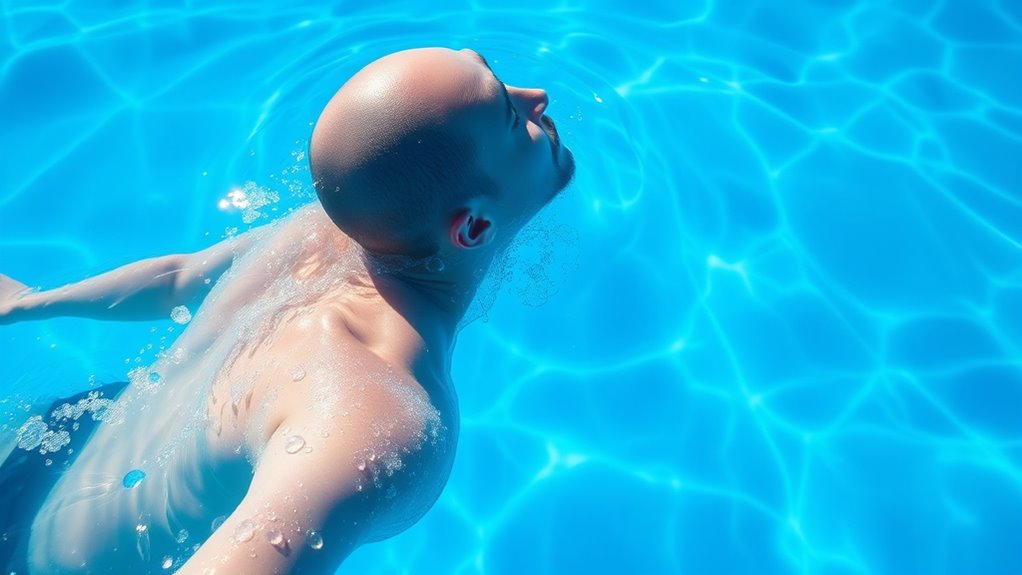When you float in saltwater, your taste buds quickly adapt to the saltiness, making the salt taste less intense over time. Continuous exposure causes sensory adaptation, which decreases your nerve response and dulls your perception of salt. This process happens within seconds to minutes, so initially strong saltiness fades as your body adjusts. If you keep experiencing this, you’ll discover more about how your senses change during extended saltwater immersion.
Key Takeaways
- Prolonged saltwater exposure causes sensory adaptation, reducing taste buds’ sensitivity to salt during floating sessions.
- Adaptation begins immediately, decreasing nerve signals sent to the brain despite ongoing salt stimulation.
- As taste buds become less responsive, the perceived saltiness diminishes over time.
- This mechanism prevents overstimulation and helps maintain overall sensory balance during extended exposure.
- Consequently, floating in saltwater makes salt taste less intense the longer you stay immersed.

Have you ever wondered how saltwater affects your sense of taste? When you float in a saltwater environment, your taste buds don’t respond the same way they do on land. Instead, they undergo a process called sensory adaptation, where their sensitivity decreases after continuous exposure to a stimulus—in this case, salt. As you remain submerged, the high salt concentration in the water constantly stimulates your taste buds, causing them to become less responsive over time. This adaptation means that your initial taste perceptions diminish, and you might not notice the salty flavor as intensely as you did at first. Your taste bud response is fundamentally dampening, which is your body’s way of preventing overstimulation and maintaining sensory balance.
This sensory adaptation occurs rapidly. The moment your tongue contacts the saltwater, your taste buds start firing signals to your brain, alerting you to the saltiness. But as the exposure continues, the nerve cells responsible for transmitting these signals start to decrease their activity. This is a natural response, designed to prevent your sensory system from becoming overwhelmed by constant stimuli. When you’re floating, your taste receptors are immersed in a surrounding environment with a uniform salt concentration, which continuously stimulates them. Over time, this persistent stimulation causes the taste buds to become less sensitive, making the salty flavor seem milder or even almost absent. This is why, after a while, you may not perceive the saltiness as strongly, even though the water remains equally salty.
Additionally, sensory adaptation is not limited to taste alone but can also affect other senses such as smell and touch, helping your body prioritize new stimuli over ongoing ones. Your taste perception isn’t just about the chemical composition of the water but also about how your sensory system adapts to it. When you first enter the saltwater, your taste buds react strongly, sending a flood of signals to your brain. But as the exposure persists, your body adjusts, and the initial sharpness fades. This adaptation can be quite rapid, sometimes within seconds to minutes, depending on the concentration of salt and how long you’ve been floating. This process explains why food or drinks that taste intensely salty on land may seem less so after prolonged immersion in saltwater. Your taste buds have essentially “tuned out” the constant salt signal, ensuring your sensory system isn’t overwhelmed and remains functional for other stimuli.
Frequently Asked Questions
Does Saltwater Affect Long-Term Taste Buds?
Saltwater doesn’t harm your long-term taste buds; instead, it causes temporary taste adaptation. When you’re exposed to salty residue, your taste buds become less sensitive to salt, making other flavors more noticeable. This is a normal response and doesn’t cause lasting damage. After rinsing or drying off, your taste buds usually return to normal, so long-term taste perception remains unaffected by brief saltwater exposure.
Can Saltwater Exposure Alter Taste Sensitivity Permanently?
Saltwater exposure can temporarily alter your taste sensitivity through taste receptor adaptation, making flavors seem less intense. However, it doesn’t usually cause permanent changes unless there’s persistent saltwater residue buildup on your tongue, which may lead to longer-lasting effects. Regular rinsing and good oral hygiene help prevent this buildup, ensuring your taste buds recover quickly and your sense of taste remains sharp over time.
How Quickly Does Taste Perception Change After Floating in Saltwater?
After a floating session in saltwater, you’ll notice an immediate taste change, often within minutes. The saltwater temporarily numbs your taste buds, dulling sensitivity and altering how flavors are perceived. This change happens quickly during your session, and it can last for a short while afterward. Typically, your taste perception gradually returns to normal within an hour or so, but the exact timing varies depending on individual sensitivity.
Are Certain Tastes More Affected by Saltwater Than Others?
Ever wonder if some tastes stand out more during saltwater floatation? You’ll find that saltwater flavor and taste distortion affect sweet, salty, and bitter tastes differently. Sweet flavors tend to diminish, while salty tastes can become more intense. Do you notice how your perception shifts? This happens because saltwater interacts uniquely with different taste receptors, making certain tastes more affected than others during your float experience.
Does Individual Taste Sensitivity Influence Saltwater’s Effects During Floating?
Your individual sensitivity and taste bud adaptation play a big role in how saltwater affects your taste during floating. If you’re more sensitive, you might notice stronger changes in taste perception, especially with salty flavors. Conversely, those with less sensitivity may experience subtler effects. As your taste buds adapt over time, their response to saltwater can diminish, making the taste changes less noticeable during future floating sessions.
Conclusion
As you float in saltwater, your taste perception shifts because your body adapts to the high salinity. notably, studies show that after just 15 minutes of immersion, your taste buds become less sensitive to sweetness and bitterness. This means that even your favorite flavors might seem muted or altered. So, next time you float, remember that the salt isn’t just relaxing—it’s actively changing how you experience taste, giving you a unique sensory perspective.









